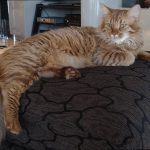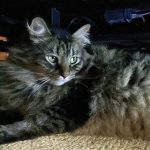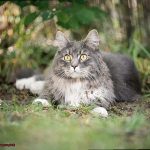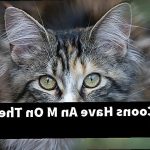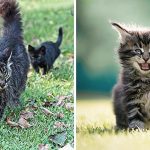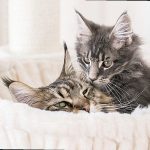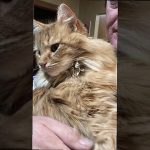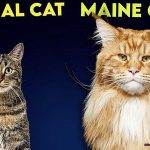Maine Coons are the feline equivalent of gentle giants. They’re friendly, loyal, and known for their striking appearance and impressive size. As a Maine Coon owner, you want to ensure that your furry friend is getting the best possible nutrition to keep them healthy and happy. But with so many different cat foods out there, it can be tough to know what’s right for your Maine Coon.
It’s no secret that cats have unique dietary requirements. And Maine Coons are no exception. These majestic creatures require specific types of food to maintain their muscular bodies and luscious coats. Plus, they’re prone to certain health issues like heart disease and joint problems. So, providing them with a well-balanced diet is crucial.
But what exactly does “specific food” mean? Well, it means finding a high-quality cat food that meets all of your Maine Coon’s nutritional needs. This includes ingredients like protein, fat, fiber, vitamins, and minerals. It also means avoiding foods that could harm your cat’s health or cause allergies.
In this post, we’ll explore why Maine Coons need specific food and what you should look for when choosing a cat food for your furry friend. We’ll cover everything from the importance of protein to the benefits of wet vs dry food. By the end of this post, you’ll have all the information you need to make sure your Maine Coon is getting the best possible nutrition for their unique needs.
What are Maine Coons?
If you are looking for a furry companion that is both bigger and friendlier than your average house cat, look no further than the Maine Coon.
This popular breed of domestic cat originated in the state of Maine, United States, and is known for its large size, fluffy coat, and friendly personality.
In this blog post, we will explore what makes Maine Coons so special and provide some tips on how to care for them.
Origins and History
Maine Coons are one of the oldest natural breeds in North America.
They were originally bred as working cats on farms and ships to help control the rodent population. Over time, they became popular as pets due to their friendly demeanor and unique characteristics.
In fact, Maine Coons are so beloved that they are now recognized by many cat associations worldwide and often seen in cat shows.
Distinctive Appearance
One of the most striking things about Maine Coons is their distinctive appearance.
They have tufted ears, long tails, and a muscular body that can weigh up to 25 pounds for males. Their coats come in a variety of colors and patterns, but all are known for their softness and fluffiness.
Maine Coons are considered a semi-longhair breed and require regular grooming to prevent matting and tangling.
Dietary Requirements
To keep your Maine Coon healthy and happy, it is important to provide them with a well-balanced diet that meets their specific nutritional needs.
While they do not require a special diet, it is important to feed them high-quality food that contains real meat as the first ingredient such as chicken, turkey, or fish.
Protein is an essential nutrient for Maine Coons as it helps them maintain muscle mass and supports their overall health.
Fats are also important for Maine Coons as they provide energy and help maintain healthy skin and coat.
However, it is important to avoid feeding them too much fat as this can lead to weight gain.
Carbohydrates should be included in small amounts in their diet. Look for cat food that contains whole grains such as brown rice and barley rather than processed grains like corn or wheat. Vitamins and minerals are also essential for their overall health and wellbeing.
Do Maine Coons Need Special Food?
While Maine Coons don’t require a specialized diet, their specific dietary requirements are essential for maintaining their health and well-being.
Firstly, Maine Coons are known for their muscular build and require protein for muscle growth and maintenance. A high protein diet can also help prevent obesity, which is common in Maine Coons due to their large size.
Additionally, carbohydrates can be harmful to Maine Coons as they are prone to diabetes. Carbs cause a spike in blood sugar levels, leading to insulin resistance and ultimately, diabetes. To avoid this, it’s best to feed them a low-carbohydrate diet.
Furthermore, Maine Coons are susceptible to certain health conditions like hip dysplasia and heart disease. To prevent or manage these conditions, Maine Coons require a diet rich in nutrients such as vitamins and minerals.
When choosing food for your Maine Coon, it’s crucial to read the ingredient list carefully. Look for high-quality protein sources like chicken, turkey, or fish. Avoid foods that contain fillers like corn or wheat as they’re high in carbs and offer little nutritional value.
The Benefits of Feeding Maine Coons High-Quality Food
Feeding them high-quality food is the way to go. These cats have unique nutritional needs that require a balanced diet to maintain their health and energy levels. But what are the specific benefits of feeding Maine Coons high-quality food? Let’s explore.
Firstly, feeding your Maine Coon a diet that is high in protein and low in carbohydrates can help keep them at a healthy weight, preventing obesity. These cats tend to gain weight easily, which can lead to various health problems such as diabetes, heart disease, and joint pain. By providing them with high-quality food, you can ensure they receive the nutrients they need while keeping their weight in check.
Additionally, premium cat foods contain ingredients such as antioxidants, omega-3 fatty acids, and vitamins that boost your cat’s immune system and protect them from illnesses. This means feeding your Maine Coon high-quality food can support their immune response and keep them healthy.
Moreover, a diet that is rich in Omega-3 and Omega-6 fatty acids can nourish their skin and coat from within. Maine Coons have long, thick fur that requires regular grooming. By providing them with the right nutrients, you can improve the quality of their coat and skin.
Lastly, feeding your Maine Coon high-quality food can promote healthy digestion by including prebiotics and probiotics that promote healthy gut bacteria. This can be especially beneficial for Maine Coons who are prone to digestive issues such as constipation or diarrhea.
Protein Requirements for Maine Coons
These extraordinary creatures require a unique nutritional balance that includes a significant amount of protein in their diet. Protein is essential for building and repairing muscle tissue, maintaining healthy skin and coat, and supporting overall health and vitality.
While the Association of American Feed Control Officials (AAFCO) recommends a minimum of 26% protein for adult cats, Maine Coons may benefit from a higher percentage due to their size and activity level. A diet containing at least 35-45% protein is recommended to meet their unique nutritional needs.
When selecting cat food for your Maine Coon, read the label carefully. Look for high-quality animal proteins such as chicken, turkey, or fish listed as the first ingredient. Avoid foods that contain fillers or by-products as these provide little nutritional value.
Raw or homemade diets may be an option for some Maine Coon owners seeking to ensure the highest quality protein possible. But it’s important to consult with a veterinarian or animal nutritionist to ensure your cat’s diet is balanced and meets all their nutritional needs.
Fats Requirements for Maine Coons
One crucial aspect of their diet is the amount and type of fats they consume. But don’t worry – fats are not necessarily the enemy when it comes to cat nutrition.
Fats are an essential component of a cat’s diet as they provide energy and help absorb important vitamins. However, the quality of fats is equally important as the quantity. In particular, Maine Coons need to consume a diet that is high in animal-based fats such as chicken fat, fish oil, and pork fat. These provide a source of omega-3 and omega-6 fatty acids that are necessary for maintaining healthy skin, coat, and overall health.
Maintaining a healthy weight is also crucial for Maine Coons. Due to their slower metabolism compared to other cats, they are prone to gaining weight if their diet is not monitored closely. Therefore, it is crucial to provide them with a balanced diet that has the right amount of fats without going overboard. Avoiding high-carbohydrate diets is also important for preventing weight gain.
So how can you ensure your Maine Coon gets the right balance of fats in their diet? A high-quality cat food containing at least 35-45% protein and high-quality animal proteins such as chicken, turkey, or fish will ensure your cat receives the necessary amount of fats. Avoid fillers or by-products as these can lead to weight gain.

In addition to animal-based fats, Maine Coons also require a small amount of plant-based fats such as flaxseed or canola oil. These provide additional sources of omega-3 fatty acids that support joint health and cognitive function.
Carbohydrate Requirements for Maine Coons
Carbohydrates are an essential component of a cat’s diet, but the amount and quality of carbohydrates that Maine Coons require differ from other breeds due to their size and energy needs.
Carbs play a crucial role in providing energy and maintaining overall health for cats. However, excessive amounts of carbohydrates in their diet can lead to various health problems, such as obesity and diabetes. Therefore, it’s essential to ensure that Maine Coons are getting the right amount of carbohydrates in their diet.
Veterinary nutritionists suggest that Maine Coons require a high-protein, low-carbohydrate diet consisting of 30-40% carbohydrates. These carbs should come from whole grains, vegetables, and fruits while avoiding high levels of simple carbohydrates like corn, wheat, and soy. This diet ensures that Maine Coons receive enough energy while preventing problems associated with excessive carbohydrate consumption.
Maine Coons are also prone to urinary tract problems due to their size and genetics. To prevent such complications, it’s necessary to ensure that they’re getting enough moisture in their diet. Wet food is an excellent option for Maine Coons as it provides the necessary hydration while meeting their nutritional requirements.
Vitamin and Mineral Requirements for Maine Coons
Maine Coons are a breed of cats that have specific nutritional requirements for optimal health. A balanced diet that includes essential vitamins and minerals is crucial to their well-being.
Vitamins are vital to Maine Coons, just like they are to humans. They require vitamin A for healthy eyesight, and vitamin B for energy production and nerve function. Vitamin C supports their immune system, while vitamin D is necessary for strong bones. Vitamin E acts as an antioxidant to protect their cells from damage, and vitamin K plays a role in blood clotting.
Minerals are equally important in their diet. Calcium and phosphorus are necessary for strong teeth and bones, which is crucial for this large breed with big bones. Magnesium supports muscle and nerve function to keep them active and playful. Potassium helps regulate blood pressure and fluid balance, while sodium maintains proper hydration levels.
To ensure that your Maine Coon receives adequate amounts of these essential vitamins and minerals, it’s important to provide them with high-quality cat food specifically formulated for their nutritional needs. Consult with a veterinarian before adding any human foods or supplements to their diet.
How to Avoid Overfeeding Your Maine Coon Cat
Maine Coon cats are known for their hearty appetites, and it is essential to ensure that they are not overfed. Overfeeding can lead to obesity and health problems such as diabetes, arthritis, and heart disease. Therefore, it is crucial to know how to avoid overfeeding your Maine Coon cat.
Establish a Feeding Routine
A feeding routine is essential in ensuring that your Maine Coon does not overeat. Feed your cat at the same time every day and ensure that they are not given too much food. This will help regulate their appetite and prevent them from overeating. Additionally, consult with your veterinarian about the appropriate amount of food for your cat.
Choose High-Quality Cat Food
Maine Coons require a high protein diet that is rich in taurine, an essential amino acid that helps maintain heart and eye health. You should choose a high-quality cat food that contains all the necessary nutrients in the right proportions. Look for cat food that is specifically formulated for Maine Coons and contains high-quality protein sources such as chicken or fish. Avoid foods that contain fillers or artificial ingredients.
Monitor Your Cat’s Weight
Regularly check your cat’s body shape and feel their ribs and spine. If you can’t feel their ribs or spine easily, they may be overweight. In this case, you should adjust their diet accordingly. Additionally, if you notice that your cat is gaining weight, it may be necessary to adjust their feeding routine or switch to a lower-calorie cat food.
Feed Small Meals Throughout the Day
Feeding small meals throughout the day will help prevent your Maine Coon from overeating. This will also reduce the risk of obesity. Additionally, it will help regulate their appetite and prevent them from begging for food.
Provide Opportunities for Exercise and Playtime
Regular exercise is crucial in maintaining your Maine Coon’s weight and preventing health problems caused by being overweight. You can provide them with toys and games that encourage physical activity, such as chasing balls or playing with interactive toys. This will also help keep them mentally stimulated and prevent boredom.
Conclusion
In conclusion, Maine Coons are truly remarkable feline companions that require specialized nutrition to thrive. As a responsible cat owner, it’s crucial to provide your furry friend with a well-balanced diet that meets all of their nutritional requirements. This means incorporating key ingredients such as protein, fat, fiber, vitamins, and minerals while steering clear of foods that could potentially harm your cat’s health or trigger allergic reactions.
Given their impressive muscular build, Maine Coons need a high-protein diet to support muscle growth and maintenance. In addition to protein, they also require animal-based fats like chicken fat, fish oil, and pork fat for healthy skin and coat. It’s important to steer clear of high-carbohydrate diets as these can lead to obesity and diabetes in the long run.
To ensure that your Maine Coon receives all the essential vitamins and minerals they need for optimal health, it’s crucial to feed them a balanced diet containing whole grains, vegetables, fruits, and high-quality protein sources such as chicken or fish.
Feeding your Maine Coon in moderation is equally important. Establishing a feeding routine and choosing high-quality cat food specifically formulated for Maine Coons can help prevent overfeeding. Monitoring your cat’s weight regularly and providing opportunities for exercise and playtime can also go a long way in keeping them healthy and happy.
By following these guidelines when selecting food for your beloved pet, you’ll be able to provide them with the best possible nutrition tailored to their unique needs.
